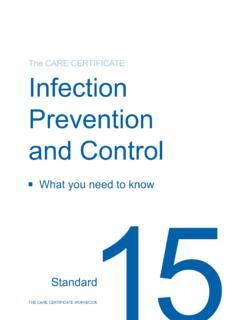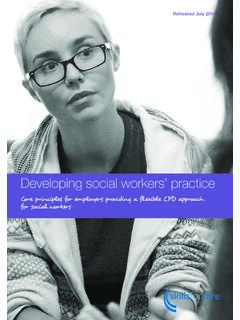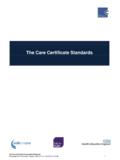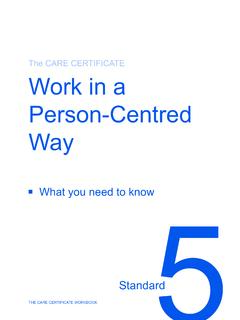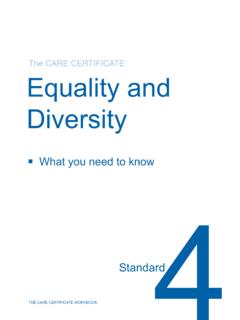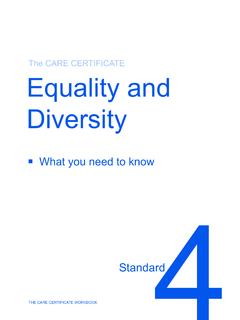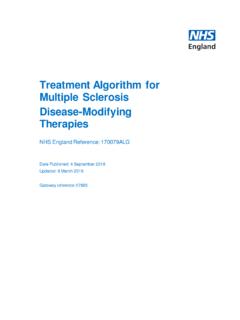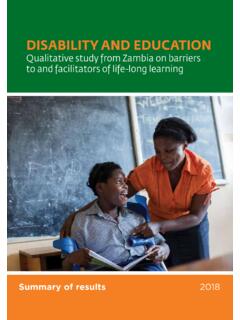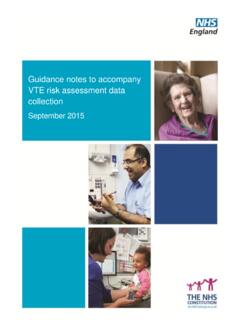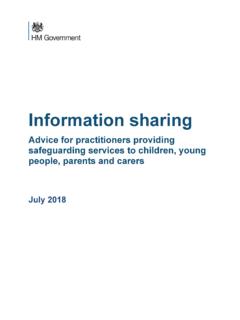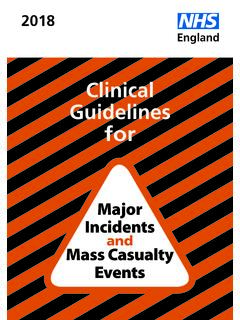Transcription of Safe and fair recruitment December 2020 - Skills for Care
1 1 safe and fair recruitment A guide to employing people with convictions in social care Contents 1. Introduction2. About this guide3. What the law says on recruiting people with convictions5. Safer recruitment checklist5. Criminal record checks6. Addressing applicants practical barriers and challenges7. Managing criminal record disclosure8. Data protection/record keeping9. Frequently asked questions10. Useful contacts and resources11. Glossary of terms12. Acknowledgements13. AppendicesU Updated December 2020 2 1. Introduction The social care sector faces vast recruitment and retention challenges. Social care faces vast recruitment and retention challenges. The sector has a national vacancy rate of 112,000 ( ) at any one time, with 430,000 ( ) staff leaving their job in the last 12 months1. Employers are seeking ways to become more innovative in their recruitment and retention practices to attract people with the right values to deliver high-quality, person-centred care, and fill Skills gaps that exist throughout the whole workforce (including ancillary roles that don t involve direct care admin, facilities management, finance and catering).
2 It s essential that recruitment practices are fair , effective and robust and focus on the need to safeguard people who need care and support. Skills for Care has tools to support employers recruit and retain a suitable workforce, including our Good and outstanding care: safe staffing guide .Social care employers are required to carry out criminal record checks as part of their pre-employment vetting. It s important to know that having a criminal record isn t an automatic barrier to working with children or adults at risk. Many people with criminal records have successful and rewarding careers working in the employers may have recruitment policies or practices in place that inadvertently exclude people with criminal records creating a barrier to open recruitment . There are nearly 12 million people in the UK with a criminal record which is more than 20% of the working-age The state of the adult social care sector and workforce in England, Skills for Care, October 20202 Home Office, 2020 There may be concern that people with criminal records are more likely to present a risk, but the reality is many people who have abused in positions of trust don t tend to have criminal people who have a criminal record come from disadvantaged or marginalised backgrounds.
3 Some of these individuals may have committed minor offences but have moved on from their past mistakes and have a wide-range of Skills and abilities to was aged 14 when her father committed suicide. Several months later her uncle also died. Whilst she was in a state of grief she ended up falling in with the wrong crowd and received a youth caution for shoplifting - stealing lipstick from a supermarket. After receiving counselling and support, Jane was able to rebuild her life successfully. She managed to achieve good grades at school and her heart was set on working in social care. Her desire to help people was instilled by some of her family (mum, aunts and grandparents) who all worked in the care sector, but Jane faced immense barriers finding a work placement due to having the caution for shoplifting. Jane s story Example Jane s case (and others who faced similar barriers) eventually led to major changes to the laws requiring people to disclose criminal records to employers.
4 These changes were introduced on 28 November 2020 to ensure that young people who made minor mistakes in their past could move on with their lives. 3 2. About this guide This practical guide is aimed at social care employers in England and Wales, including individuals who employ their own care and support staff. It may also be of interest to policy makers and commissioners, including local authorities and Clinical Commissioning Groups as well as organisations who advise and support individuals into will help social care employers to understand their legal rights and responsibilities when carrying out criminal record checks and implement safe and fair recruitment policies and procedures. It will help employers to implement safe and fair recruitment policies and procedures, giving them the confidence and tools to strike the balance between safeguarding people and addressing any barriers that may prevent them accessing a vast potential talent pool.
5 It will also help employers carry out effective risk assessments on applicants who have criminal records (or have been subject to allegations) so that they can make informed decisions about their suitability for the note: This guidance had been created with expert input from specialist advisors in safer recruitment and criminal convictions (see acknowledgments). Specific queries should be directed to HR teams or legal in bold are defined in the glossary at the 3. What the law says on recruiting people with convictions The rehabilitation of Offenders Act 1974 (ROA) allows conditional cautions and convictions to be considered spent ( legally ignored ) after a specified period of time, known as the rehabilitation period. The length of the rehabilitation period is determined by the sentence or out-of-court disposal received. If the person is reconvicted within this rehabilitation period, none of their convictions will become spent until they all are.
6 Once the record is considered spent, the law treats the person as if they d never committed an offence. They no longer have to disclose the conditional caution or conviction when applying for a job (or self-employment), education or training courses unless the role applied for is exempt from the ROA. If someone s conditional caution or conviction is spent, it s unlawful for employers to consider it when making a decision about their suitability for a job. Full guidance on the ROA can be found on the Nacro or existing staff and volunteers should be signposted to Nacro or Unlock if they need advice or guidance on if their criminal record is spent. Who is Nacro?Nacro is a social justice charity providing free support for employers on managing criminal record matters. See useful contacts and resources (pg. 41) for further in social care exempt from ROAU nsurprisingly, a large number of jobs in social care and health are exempt from the ROA due to the rehabilitation of Offenders Act 1974 (Exceptions Order) 1975, more commonly known as the ROA Exceptions the past, roles included in the ROA Exceptions Order required the applicant or employee to disclose to the employer all convictions, cautions, reprimands and final warnings including those regarded as spent.
7 But this is no longer the case. See DBS filtering (page 6) for further the ROA apply to jobs in social care?Not all roles in the social care and health sector are exempt from the ROA. Roles that are covered by the ROA typically don t involve delivering care and may have only incidental contact with children or adults at risk, for example catering, facilities, administrative staff and other ancillary roles. These roles require the applicant to disclose only unspent cautions or convictions. We look at some of these roles in the DBS eligibility scenarios the ROA apply throughout the whole of the UK?The ROA exists throughout the whole UK, including people serving in the armed forces who are subject to military law, but it s important to note that there are differences between the individual countries. This guidance covers the law in England and are significant differences in the way in which the ROA operates in Scotland. The relevant Northern Irish legislation is the rehabilitation of Offenders (Northern Ireland) Order 1978.
8 The length of time it takes for a caution or conviction to become spent in Scotland or Northern Ireland may be different to England and Wales. Employers with staff in these regions should review their policies on the recruitment of people with criminal convictions to take the differences into details on the different rehabilitation periods in Scotland or Northern Ireland can be found on the Nacro the role is covered by the ROA, employers should ask applicants at the appropriate point in the recruitment process: Do you have any unspent conditional cautions or convictions?Best practice is to ask this question of those shortlisted for interview. An employer is also allowed to ask about pending prosecutions, but only if the applicant has been charged with an offence. When asking this question, employers should remind applicants they re required by law to disclose all unspent conditional cautions or convictions, regardless of whether they re convicted in the UK or abroad; and unspent criminal convictions or relevant service discipline convictions received within the Service Justice System ( through Summary Hearing or Court Martial).
9 Does the ROA apply to people convicted overseas?The ROA applies to a person with a criminal record regardless of where they were convicted. If someone has been convicted of a criminal offence overseas which has an equivalent (or similar) offence in England and Wales, they re still legally required to disclose their criminal record when applying for roles in the social care sector in England and Wales. Employers must apply a consistent approach to all overseas applicant would need to apply the disclosure law as applicable in England and Wales when applying for a job in England and Wales - not the law in their country of origin or where they were is 20 years old. He was convicted of shoplifting in a court in England and Wales and received a 100 fine. Under the ROA, the fine may become spent after 12 months in England and Wales. If Tom applies for a job covered by the ROA, he will need to disclose the conviction to his employer for 12 months - if he isn t reconvicted during this time.
10 Martina is 24 years old. She was convicted of theft in a court in Spain and received a 100 fine. If Martina applies for a job in England or Wales which is covered by the ROA, she will also need to disclose the conviction to her employer for 12 months - if she isn t reconvicted during this time. Tom s story Martina s story Example Example Golden ruleRegardless of which country they were convicted in, a person from overseas applying for a role in social care covered by the ROA would need to disclose the conviction to an employer for the same length of time as if they d been convicted in England and Wales. 6 What is a specified offence?A specified offence is a serious offence (mainly sexual or violent offences, or relevant to safeguarding) which is contained on the DBS list of specified offences and must always be disclosed when applying for positions under the ROA Exceptions filteringOn 28 November 2020, important changes to the ROA Exceptions Order removed the requirement for applicants or existing employees to disclose reprimands, final warnings, youth cautions and youth conditional cautions.
